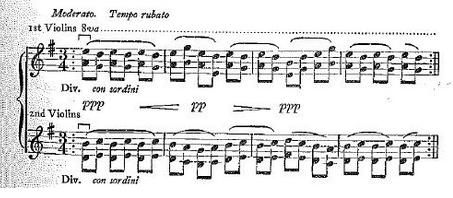Editor’s Note: This encounter with a pixy or strange auditory illusion took place in 1921 on Dartmoor. Thomas Wood was a noted composer. For more on fairy music…
That is what the scene is on the stage. But out on the open moor in sunlight two months before rehearsals began I had to imagine what it would be like; I could not know. The only way of fitting the music and the sense was to work by time and calculation. I had the text, the Family Bible and a stopwatch for tools, and for a guide the memory of Stanford’s harsh voice giving the advice that every composer for the theatre must lay to heart: ‘Pace it, me boy, pace it.’ Pace it I did, to and fro among the heather, conducting to the empty air. That section seemed all trim. Now time it. I got down again flat on my belly, set the stop-watch: go. Solo viola lead at the cue to ‘Will!’ Will’ – thirty one seconds – put repeat bars in for safety; violas again at ‘Let me pass’ – thirteen seconds; Portia’s harp entry – better have a pause at the second bar – four seconds; the ‘St Valentine’s Day’ for Orphelia – seven seconds. And just then I heard my own name called. ‘Tommy! Tommy!’ And once more nearer ‘Tom-my!’ There was no one in sight. I picked up the field glasses to make sure. The moor was as empty as the sky. Picknickers sometimes wanders along the Teign, behaving oddly, but this eyrie was out of their ken, hard to find; and even if the wind had been more than a fitful summer breeze the river was to leeward. And I had not dozed off. I was most certainly and completely awake, with a stopwatch ticking in my hand. Searching for intruders seemed futile, yet I did search irritably. I knew I should find nothing. That voice had sounded quite near. Within twenty yards. It was not the voice of anyone in camp. And no-one in camp called me Tommy. They knew better. Thomas, yes, or Tom; but no diminutives. That was agreed on. And no one I could bring to mind had a voice of this particular quality. It was small, quite clear, faintly mocking, pitched high. Yet it was not a woman’s voice. It might even have been a man’s if he slipped easily into falsetto. Had I been honoured by a visit from a Pixie?… I went back to the same place next day. The weather was more steamingly hot than ever. Dartmoor was asleep; so were the bees, the hawks, the wind, and the tors filmy against the blue. Everything asleep but me. I kept most brilliantly and tenaciously awake, listening, prone by the rowan bush on top of the family bible and trying to work at the second part of the Masque. An hour went by; an hour and a half. The shadows lifted as the sun moved. No other change. And then I heard the last thing I could have expected to hear – music in the air as faint as breath. It died away; came back louder, hung over me swaying like a censer [inspired image!] that dips and swings, and is withdrawn. In all it lasted twenty minutes, which was a period of time quite long enough for me to settle that no human agency within my knowledge could bring music of that kind into that place; and more mature reflection still leads me to believe that this conclusion was right. Portable wireless sets were unknown in 1921; heather-covered moor will not carry sound far and the day was a roaster; my field glasses again assured me that no picknicker was in sight, still less a gramophone, and what I heard could not possibly have been music of the mind extraverted into music for the ear. Nor was it music that resembled in the least the music that I had just written or even music that I wanted to write. The key, style and scoring of the two had nothing in common. It would be a fine and swaggering claim to assert that I made exact notes of what I heard, but it would be unscholarly and untrue. Taking down an unfamiliar tune at one hearing is not easy, and I have yet to meet the man who can take down a four-part harmony, played at speed, in such a way that he is completely certain of his accuracy. And this music was essentially harmonic. It was not a melody, an ‘air’. It sounded like the weaving together of various tenuous fairy strands.


